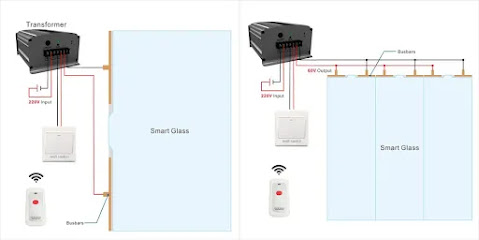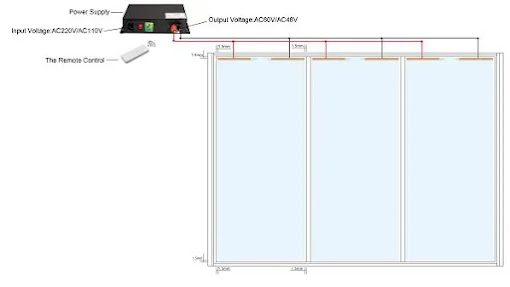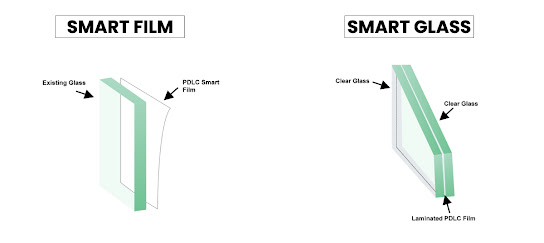As modern spaces evolve, the demand for adaptable and intelligent design solutions continues to rise. One such innovation making waves in the design world. Smart Glass Vs Smart Film Both technologies offer privacy, energy efficiency, and aesthetic appeal, but how do you decide which one is right for your space? Let’s dive into the comparison, with a spotlight on why smart film could be your preferred choice.

What is Smart Glass?

Smart glass, also known as switchable glass, uses an electrochromic system that adjusts opacity at the flick of a switch. It’s widely used in offices, homes, and even automobiles. By incorporating liquid crystal or particle-based technology between glass layers, smart glass allows users to switch between transparent and opaque modes. This is perfect for controlling light, glare, and privacy in one go.
Advantages:
- Seamless Integration: It offers a clean, sleek look since it replaces traditional windows entirely.
- Durability: As a solid glass unit, it’s sturdy and long-lasting.
- Energy Efficiency: It can block UV rays and regulate indoor temperatures, contributing to lower energy costs.
Drawbacks:
- High Installation Costs: Smart glass can be expensive, both in terms of initial investment and installation, which involves replacing existing windows.
- Less Flexibility: Once installed, smart glass is a fixed part of the building structure, leaving little room for future modifications.
What is Smart Film?

Smart film, on the other hand, is a flexible, adhesive layer that can be applied directly to existing glass surfaces. Like smart glass, it uses a similar electrochromic system that allows it to switch between transparent and opaque states. The major difference? Smart film provides the same benefits as smart glass, without requiring an entire glass unit replacement.
Advantages:
- Cost-Effective: Smart film is significantly more affordable than smart glass.
- Flexibility in Application: Whether it’s for a residential window, office partition, or even glass doors, smart film can easily be installed on various surfaces.
- Energy Efficiency: Just like smart glass, smart film helps regulate heat and light, making it a sustainable choice.
- Retrofit Capability: You don’t need to replace your entire window; smart film can be applied to existing glass. Making it a perfect retrofit solution for those who want the benefits of smart technology without the extensive installation process.
- Easy Maintenance and Replacement: If there’s a need to replace the film or change its location, the process is straightforward and much less disruptive compared to replacing smart glass.
Drawbacks:
- Durability: While it offers flexibility, smart film may not be as durable as smart glass over the long term, particularly in high-traffic areas.
- Aesthetic Differences: Although it’s sleek, it might not provide the same polished look as fully integrated smart glass, especially when installed over older or irregular glass surfaces.
Comparing the Two:

| Feature | Smart Glass | Smart Film |
| Cost | High (requires full glass replacement) | Affordable (retrofit option) |
| Installation | Complex, professional installation required | Simple, can be applied to existing glass |
| Durability | High, solid glass unit | Moderate, dependent on film quality |
| Flexibility | Fixed once installed | Can be removed or reapplied |
| Aesthetics | Sleek, built-in solution | Sleek but may vary based on glass condition |
| Maintenance | Low, but complex to replace | Easy to maintain and replace |
Why Smart Film Might Be the Right Choice for Your Space
If you’re looking for a balance between cutting-edge technology and budget-friendly installation, smart film may be the better option for your space. It’s especially ideal for retrofitting, offering flexibility and ease of use without the hefty price tag of smart glass. Whether for residential or commercial use, smart film provides the benefits of privacy control, energy efficiency, and modern aesthetics with less commitment in terms of both installation and cost.
Smart film is a game-changer for those who want the perks of switchable glass technology but prefer an easy-to-install, adaptable, and affordable solution. While smart glass might appeal to larger, permanent installations or new constructions, smart film gives you the freedom to upgrade your space on your terms.
Final Thoughts
When choosing between Smart Glass Vs Smart Film, consider your specific needs. For new builds or long-term projects where aesthetics and durability are paramount, smart glass might be the way to go. However, for versatility, cost-effectiveness, and easy installation, smart film shines as the perfect solution for most spaces.
Whichever option you choose, embracing smart technology in your space is a step toward creating a more dynamic, energy-efficient, and futuristic environment.

